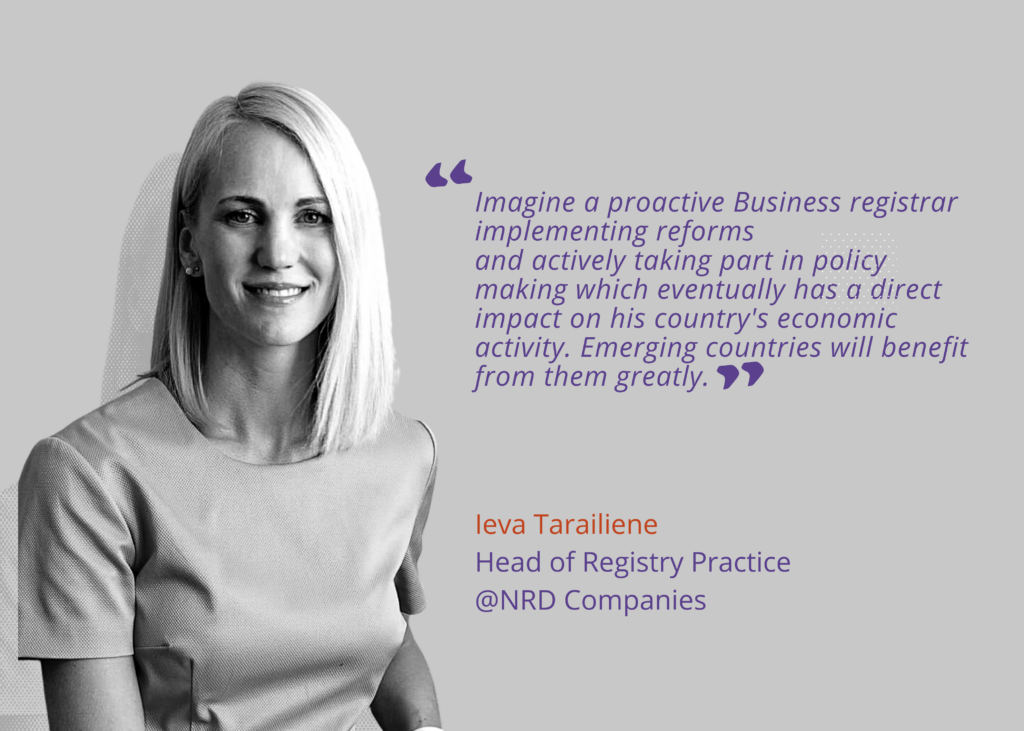Today it is clear that the economy cannot prosper without a healthy private sector. Thriving local businesses create jobs and generate income that later brings immense value at the national level. Therefore, any government, concerned with economic well-being and its advancement, should pay special attention to laws and regulations affecting local micro, small and medium enterprises (MSMEs).
The effective regulatory environment offers MSMEs the opportunity to grow and innovate. On an international level, regulators assess their domestic business environment and areas for further improvement based on the World Bank’s Doing Business report.
Since its launch, the Doing Business framework has become one of the important indicators for companies choosing countries where to invest. From a political point of view, this index has become a tool to measure the success of governments’ worldwide, driving countries to compete in the international arena.

Building a company registry that facilitates growth
The Doing Business report includes specific categories concerning economic development. The “Starting a business“ section covers how favourable the regulatory policies are for new ventures. One of the key indicators of a business encouraging environment is a well-developed registration system, as it directs people with good ideas towards the path of formal entrepreneurship. Alas, in many countries the matter is still subject to a lot of red tapes.
Why is having an effective business registration system important for every country? The private sector, through investment and job creation, plays a crucial role in a country’s fight against poverty. Where an effective private sector is lacking, business registration reform has been shown to be one of the essential first steps toward fostering private-sector growth.
In order for business registration improvements to be properly reflected in the Doing Business ratings, we need to address four major indicators – time, procedures, cost and paid-in minimum capital. These indicators could be affected by improving governance, organizational setting and institutional capacity, as well as optimizing the business process efficiency.
Addressing the key factors
Streamlining business registration requires reforms; therefore, the prior indicators can be further broken down into the following factors, supporting a targeted effort.
Implementing e-services
The use of e-services by business registers is seen as an important tool to improve efficiency, help drive costs down and provides better service for customers. Efficient and interoperable registers are prerequisites to provide citizens and businesses with high-quality electronic services and to automate administrative processes. In addition, process digitization means that data can be effectively reused by the authorities, as information sharing plays a vital part in reducing the administrative burden on businesses.
Establishing a unique company ID
The business registry is the place where business begins: the starting point for interaction between business and government, and the source of truth to the real status of a business. That’s why it is essential to have a unique business identifier that correctly references a legal entity. The unique ID is provided during the registration and should be the same throughout all other administrative systems as well.
Reducing third-party dependency
Formalizing a business often involves multiple interactions not only with public authorities but also with third-party professionals – lawyers and notaries – whose services are either required by law or desirable because of regulatory complexity. This adds additional, often unnecessary, costs and procedures business owners have to go through when establishing a company.
Economies with greater third-party involvement in business incorporation tend to have more businesses operating in the informal sector. Therefore, it is essential to make the regulatory policies clear and easy to understand, as well as eliminate the need for notarization except in cases when it is an absolute necessity.
Reducing the need for paid-in minimum capital
Legislative changes to abolish or reduce the minimum paid-in capital for businesses also tend to facilitate MSMEs registration, since micro and small businesses may have limited funds to meet the minimal requirement. Instead of relying on capital to protect creditors and investors, some have implemented alternative approaches, such as the inclusion of provisions on solvency safeguards in their legislation, or preparing audit reports, which verify that the amount a company has invested is enough to cover its establishment costs.
A one-stop solution for faster progress
In order to improve the business environment, to minimize the number of procedures, time and cost, it is very important to implement the digital transformation of the organizations, which are responsible for the business environment. To redefine existing business models and create new ones by leveraging digital technologies.
Business registers can become an open “one-stop shop” for entrepreneurs, enabling ventures to communicate with the government and obtain information regarding laws and regulations. This would facilitate business sector growth, as well as help the country significantly improve its rank in the Doing Business report and make it more appealing for foreign investment.
===
I am advocating for all Business registrars around the world especially Africa region and try to showcase their impact and importance on the business environment. Imagine a confident and influential Business registrar implementing reforms and actively taking part in policy-making which eventually has a direct impact on his country’s economic activity. Long and costly business registration and regulatory procedures have a negative effect on citizens’ motivation to set up companies. The easier, faster, and cheaper the business registration process becomes, the higher number of businesses are in an economy. And last but not the least, don’t forget that the main goal of business registration reforms is not only to reduce the number of steps or days but also to create a sustainable, modern and accurate business register, which can be a key element of the business environment system.
To learn more about strategies and tactics of how How to Climb up in Ease of Doing Business Rankings, please register for a free webinar.
About an author

Ms. Ieva Tarailienė holds the Head of Registry Practice position and principal consultant’s roles at NRD Companies. She is an experienced consultant and expert focused on public registers and corporate/company law, strategic planning and realization of advanced IT solutions related to public e-services.
Ms. Ieva Tarailienė has working experience at the State Enterprise Centre of Registers, Lithuania. She has been most involved with Lithuanian Business registry development and operations and has longstanding experience in the development of electronic services, contributing to drafting legal acts on the regulation of corporate activities, representing national developments in company law and public e-services on the national and international scene.














